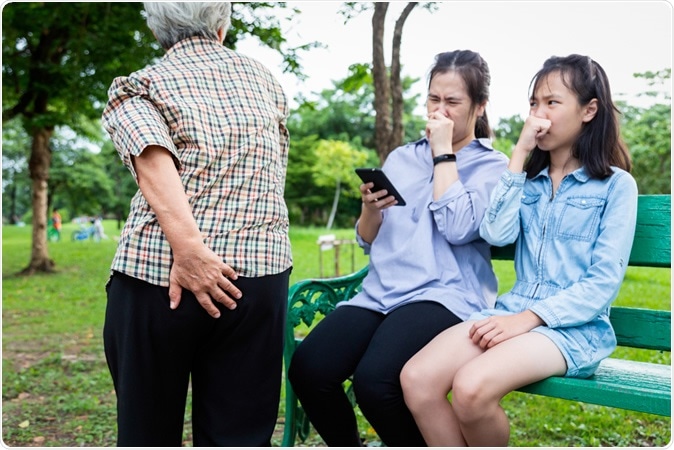
Silent but deadly! Image Credit: CGN089 / Shutterstock
Swan said, "Luckily, we wear a mask, which covers our farts all the time," he said, referring to the protective garments of underwear, pants, dresses, shorts, and others. "I think that what we should do in terms of social distancing and being safe is that… you don't fart close to other people, and that you don't fart with your bottom bare."
Australian emergency physician Dr. Andy Tagg, asked on Twitter, "So, can the bottom-based emissions of someone with coronavirus be silent and deadly?" He said that farting could be an "aerosol-generating procedure."
Studies to support the theory
In a recently published study from the Association for Professionals in Infection Control and Epidemiology, the fecal spread of the infection was speculated. The study showed that post flushing, the aerosolized "toilet plume," could contain fecal particles as well as the virus. This toilet plume could be spreading the infection, they found.
Purdue University mechanical engineering professor Dr. Qingyan Chen, on the study, said in a statement, "Close the lid and then flush." He explained that just closing the lid before flushing could stop 80 percent of the fecal particles from being aerosolized and thus stop the spread of the infection.
Chen advised, "…it's all about shutting the lid before you flush, and washing your hands after dealing with the number twos."
Dr. Aaron E. Glatt, a Mount Sinai South Nassau epidemiologist and professor of medicine at the Icahn School of Medicine at Mount Sinai, said in his statement, "Studies have clearly shown that a significant percentage of COVID-19 patients do have GI [gastrointestinal] symptoms (alone, or in combination with respiratory or other general symptoms) at the time of illness presentation." He added, "However, there are no published data on whether flatulence alone presents any risk of transmission, although, in a clothed person, it would be unlikely to be a significant route of transmission."
Not all experts agree
Dr. Sam Hay, in a statement to website body+soul said that he did not believe in this theory of fecal aerosols spreading COVID-19. He said, "Personally, I think this is a load of crap - pun intended. I think it's sensationalist to spread the fear that a simple fart could underlie the great COVID-19 pandemic of 2020." He said that the risk of getting the infection from farts is "infinitely low". Dr. Hay said, "Drawing a link to farts - which may or may not carry tiny poo particles - and the spread of COVID-19, is a little far-fetched. Sure, it may be theoretically possible, but the risk is going to be infinitely low. And there's absolutely zero evidence for it at all."
He added, however, "There's increasing evidence that gastrointestinal symptoms form part of the clinical picture for COVID-19, and that includes diarrhea. There's also good evidence that the virus is found in feces. Therefore the fecal-oral route of transmission needs attention."
Conclusions and Recommendations
The Centre for Disease Prevention and Control (CDC) also says that infections are capable of spreading via different portals in the body such as mouth (orally via food and water contaminated with feces), eyes, nose, respiratory tract, broken skin or wounds and genitals (sexual contact). Caution is warranted the organization says to prevent such spread.
Handwashing frequently remains one of the major recommendations. Washing hands for 20 seconds after using the toilet should be practiced. The Oregon and New York health officials have warned against oral contact with feces during sex, especially if a partner is suspected to be positive for COVID-19 infection.
Dr. Andy Tagg tweeted, saying, "Perhaps SARS-CoV-2 can be spread [through] the power of parping — we need more evidence. So remember to wear appropriate PPE at all times and stay safe!"
Medical professionals have warned against taking this information at face value and are recommending more studies and evidence to accept this as a fact. They, however, recommend good bathroom hygiene to all to prevent the spread of the infection.